专题11 一般过去时(课件)-2024年小升初英语复习讲练测(全国通用版)(共20张PPT)
文档属性
| 名称 | 专题11 一般过去时(课件)-2024年小升初英语复习讲练测(全国通用版)(共20张PPT) |  | |
| 格式 | pptx | ||
| 文件大小 | 33.2MB | ||
| 资源类型 | 试卷 | ||
| 版本资源 | 通用版 | ||
| 科目 | 英语 | ||
| 更新时间 | 2024-06-17 18:24:23 | ||
图片预览

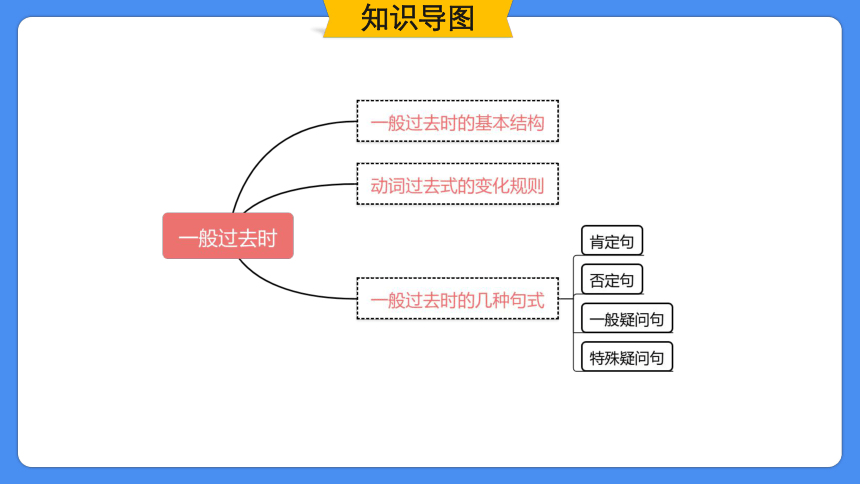
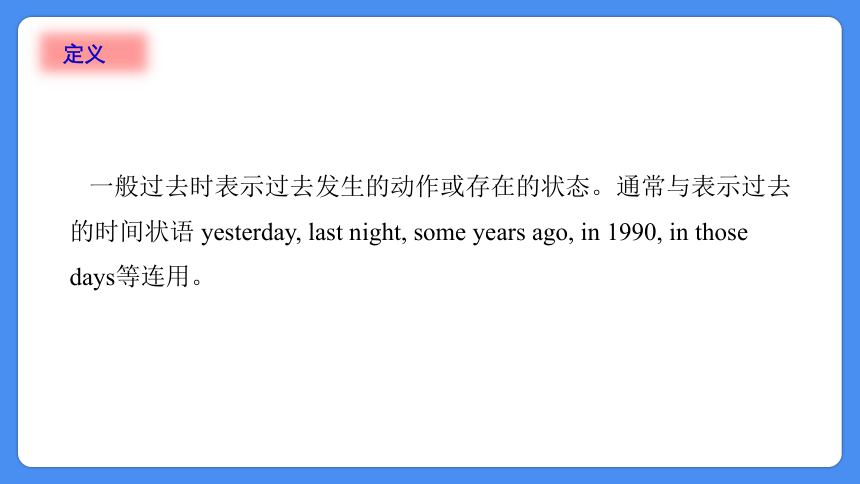
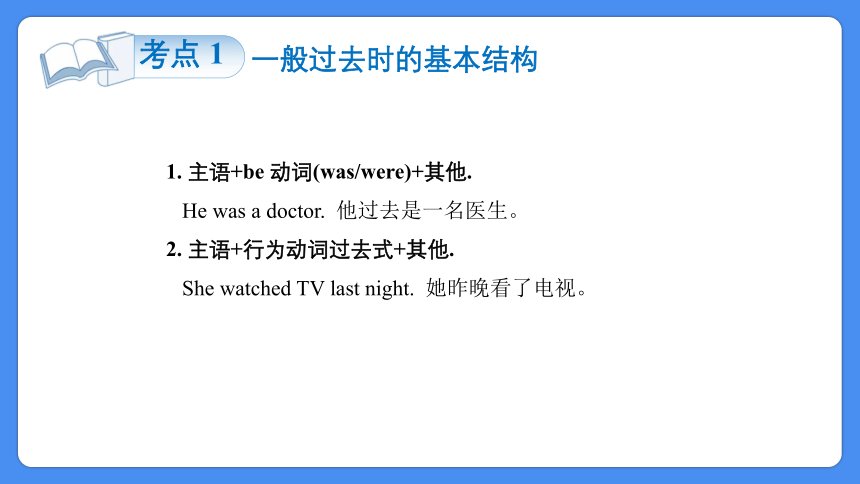
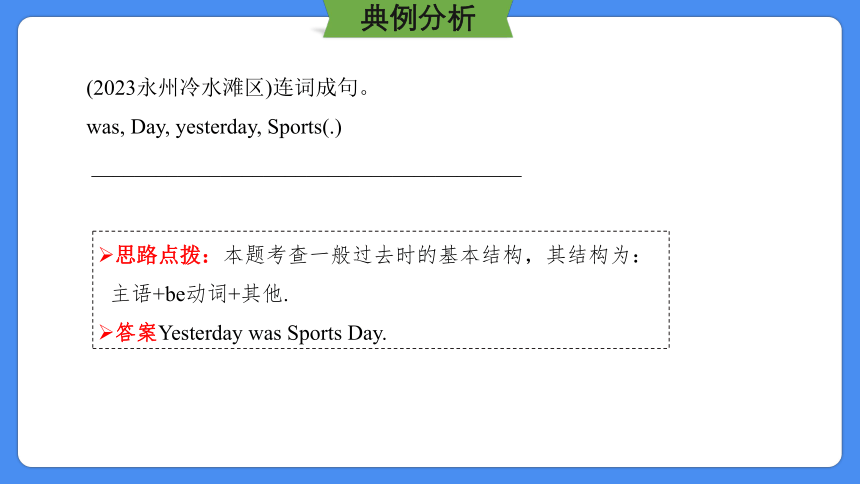
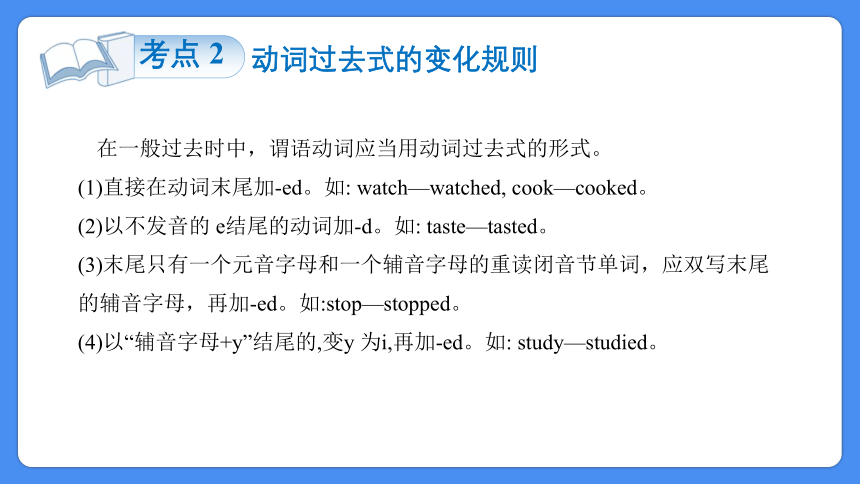

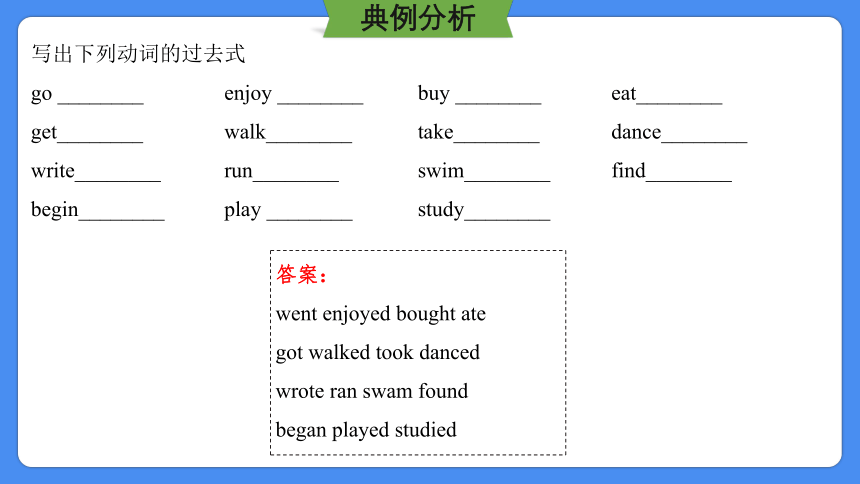
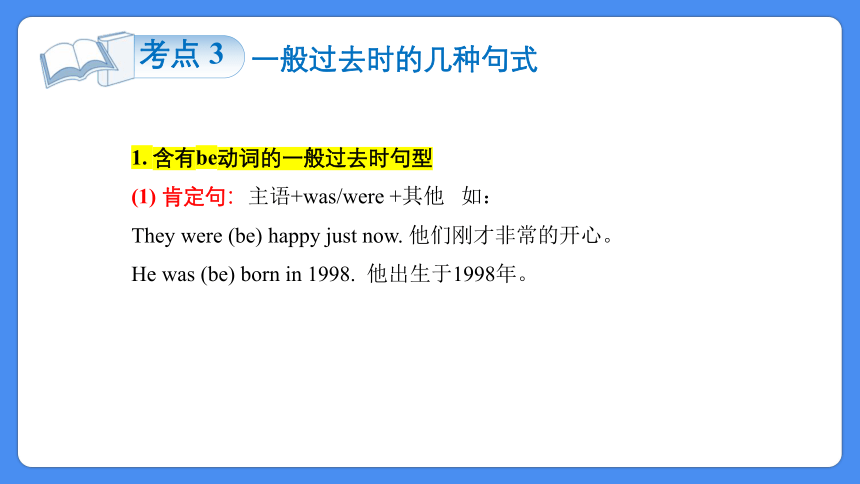
文档简介
(共20张PPT)
第十一讲 一般过去时授课人:小升初英语专题复习知识导图
一般过去时表示过去发生的动作或存在的状态。通常与表示过去的时间状语 yesterday, last night, some years ago, in 1990, in those days等连用。
定义
一般过去时的基本结构
考点 1
1. 主语+be 动词(was/were)+其他.
He was a doctor. 他过去是一名医生。
2. 主语+行为动词过去式+其他.
She watched TV last night. 她昨晚看了电视。
典例分析
(2023永州冷水滩区)连词成句。
was, Day, yesterday, Sports(.)
________________________________________
思路点拨:本题考查一般过去时的基本结构,其结构为:主语+be动词+其他.
答案Yesterday was Sports Day.
动词过去式的变化规则
考点 2
在一般过去时中,谓语动词应当用动词过去式的形式。
(1)直接在动词末尾加-ed。如: watch—watched, cook—cooked。
(2)以不发音的 e结尾的动词加-d。如: taste—tasted。
(3)末尾只有一个元音字母和一个辅音字母的重读闭音节单词,应双写末尾的辅音字母,再加-ed。如:stop—stopped。
(4)以“辅音字母+y”结尾的,变y 为i,再加-ed。如: study—studied。
(5)动词过去式的不规则变化:
do—did; see—saw; eat—ate; have—had; make—made;
tell—told; sell—sold; lose—lost; get—got; meet—met;
drink—drank; swim—swam; sing—sang; give—gave; sit—sat;
ring—rang; come—came; run—ran; become—became; fly—flew;
blow—blew; grow—grew; know—knew; draw—drew; take—took;
shake—shook; stand—stood; understand—understood write—wrote; drive—drove;
rise—rose; ride—rode; speak—spoke; break—broke; wake—woke
feel—felt; smell—smelt; sleep—slept; sweep—swept; leave—left
buy—bought; catch—caught; bring—brought; think—thought; fight—fought;
teach—taught hear—heard; find—found; forget—forgot; choose—chose
fall—fell; hide—hid; say—said; send—sent; spend—spent
learn—learnt; mean—meant; build—built; hold—held
典例分析
写出下列动词的过去式
go ________ enjoy ________ buy ________ eat________
get________ walk________ take________ dance________
write________ run________ swim________ find________
begin________ play ________ study________
答案:
went enjoyed bought ate
got walked took danced
wrote ran swam found
began played studied
一般过去时的几种句式
考点 3
1. 含有be动词的一般过去时句型
(1) 肯定句:主语+was/were +其他 如:
They were (be) happy just now. 他们刚才非常的开心。
He was (be) born in 1998. 他出生于1998年。
(2) 否定句:主语+ wasn’t/weren’t +其他 如:
They weren’t happy just now. 他们刚才不是很开心。
(3) 一般疑问句:Was/Were+主语+其他?
肯定回答:Yes, 主语+was/were.
否定回答:No, 主语+wasn’t/weren’t.
例:They were at home just now. (改为一般疑问句并作回答)
—Were they at home just now
—Yes, they were. /—No, they weren’t
2. 含有行为动词的一般过去时的句型
(1) 肯定句:主语+动词的过去式(动词+ed) +其他 如:
The old man lived in America last year.
这位老人去年居住在美国。
(2) 否定句:主语+didn’t +动词原形+其他 如:
The old man didn’t live (not live) in America last year.
这位老人去年没有居住在美国。
(3) 一般疑问句:Did +主语+动词原形+其他
肯定回答:Yes, 主语+did.
否定回答:No, 主语+didn’t.
例:The old man lived in America last year. (改为一般疑问句并作回答)
—Did the old man live in America last year
—Yes, he did. /—No, he didn’t.
(4) 特殊疑问句:特殊疑问词+did+主语+动词原形+其他? 如:
What did Lucy do last weekend 露西上周做了什么?
例:David went to the zoo last Saturday. (对划线部分进行提问)
What did David do last Saturday.
典例分析
按要求完成句子。
I climbed mountains last Sunday.
1.改成否定句: I ________ ________mountains last Sunday.
2.改成一般疑问句: ________you ________ mountains last Sunday
3.作肯定回答: Yes, ________ ________.
4.作否定回答: No,________ ________.
思路点拨:由last Sunday和climbed可知此句是一般过去时。牢记一般过去时的各种句式结构,此题就能迎刃而解。如:否定句为“主语+助动词(didn't)+动词原形+其他.”,一般疑问句为“助动词(Did)+主语+动词原形+其他 ”,尤其要注意的是否定句和疑问句中动词必须用原形。
答案 1.didn’t climb 2.Did climb 3.I did 4.I didn’t
典例分析
I didn't go hiking last weekend.
Did Mike do his homework yesterday
I went to the park last Sunday.
一、按要求改写句子。
1. I went hiking last weekend. (改成否定句)
________________________________________________
2. Mike did his homework yesterday. (改成一般疑问句)
________________________________________________
3. I go to the park every Sunday.(用last Sunday 代替 every Sunday 改写句子)
________________________________________________
典例分析
D
A
二、单项选择。
( ) 1. ________ he ________ a good time last Sunday
A. Were;have B. Did;do C. Were;do D. Did;have
( ) 2. The train from Tianjin ________ an hour ago.
A. arrived B. has arrived C. was arriving D. arrived at
( ) 3.—Who is the lady in the photo
—She is my aunt. When I was in America, she ________ good care of me.
A. takes B. takes C. is taking D. took
( ) 4.—What did Mary ________ in the market
—She ________ so me fruit and meat.
A. buy;buy B. bought;bought C. buy;bought D. buy;will buy
典例分析
D
C
授课人:Thank you!
第十一讲 一般过去时授课人:小升初英语专题复习知识导图
一般过去时表示过去发生的动作或存在的状态。通常与表示过去的时间状语 yesterday, last night, some years ago, in 1990, in those days等连用。
定义
一般过去时的基本结构
考点 1
1. 主语+be 动词(was/were)+其他.
He was a doctor. 他过去是一名医生。
2. 主语+行为动词过去式+其他.
She watched TV last night. 她昨晚看了电视。
典例分析
(2023永州冷水滩区)连词成句。
was, Day, yesterday, Sports(.)
________________________________________
思路点拨:本题考查一般过去时的基本结构,其结构为:主语+be动词+其他.
答案Yesterday was Sports Day.
动词过去式的变化规则
考点 2
在一般过去时中,谓语动词应当用动词过去式的形式。
(1)直接在动词末尾加-ed。如: watch—watched, cook—cooked。
(2)以不发音的 e结尾的动词加-d。如: taste—tasted。
(3)末尾只有一个元音字母和一个辅音字母的重读闭音节单词,应双写末尾的辅音字母,再加-ed。如:stop—stopped。
(4)以“辅音字母+y”结尾的,变y 为i,再加-ed。如: study—studied。
(5)动词过去式的不规则变化:
do—did; see—saw; eat—ate; have—had; make—made;
tell—told; sell—sold; lose—lost; get—got; meet—met;
drink—drank; swim—swam; sing—sang; give—gave; sit—sat;
ring—rang; come—came; run—ran; become—became; fly—flew;
blow—blew; grow—grew; know—knew; draw—drew; take—took;
shake—shook; stand—stood; understand—understood write—wrote; drive—drove;
rise—rose; ride—rode; speak—spoke; break—broke; wake—woke
feel—felt; smell—smelt; sleep—slept; sweep—swept; leave—left
buy—bought; catch—caught; bring—brought; think—thought; fight—fought;
teach—taught hear—heard; find—found; forget—forgot; choose—chose
fall—fell; hide—hid; say—said; send—sent; spend—spent
learn—learnt; mean—meant; build—built; hold—held
典例分析
写出下列动词的过去式
go ________ enjoy ________ buy ________ eat________
get________ walk________ take________ dance________
write________ run________ swim________ find________
begin________ play ________ study________
答案:
went enjoyed bought ate
got walked took danced
wrote ran swam found
began played studied
一般过去时的几种句式
考点 3
1. 含有be动词的一般过去时句型
(1) 肯定句:主语+was/were +其他 如:
They were (be) happy just now. 他们刚才非常的开心。
He was (be) born in 1998. 他出生于1998年。
(2) 否定句:主语+ wasn’t/weren’t +其他 如:
They weren’t happy just now. 他们刚才不是很开心。
(3) 一般疑问句:Was/Were+主语+其他?
肯定回答:Yes, 主语+was/were.
否定回答:No, 主语+wasn’t/weren’t.
例:They were at home just now. (改为一般疑问句并作回答)
—Were they at home just now
—Yes, they were. /—No, they weren’t
2. 含有行为动词的一般过去时的句型
(1) 肯定句:主语+动词的过去式(动词+ed) +其他 如:
The old man lived in America last year.
这位老人去年居住在美国。
(2) 否定句:主语+didn’t +动词原形+其他 如:
The old man didn’t live (not live) in America last year.
这位老人去年没有居住在美国。
(3) 一般疑问句:Did +主语+动词原形+其他
肯定回答:Yes, 主语+did.
否定回答:No, 主语+didn’t.
例:The old man lived in America last year. (改为一般疑问句并作回答)
—Did the old man live in America last year
—Yes, he did. /—No, he didn’t.
(4) 特殊疑问句:特殊疑问词+did+主语+动词原形+其他? 如:
What did Lucy do last weekend 露西上周做了什么?
例:David went to the zoo last Saturday. (对划线部分进行提问)
What did David do last Saturday.
典例分析
按要求完成句子。
I climbed mountains last Sunday.
1.改成否定句: I ________ ________mountains last Sunday.
2.改成一般疑问句: ________you ________ mountains last Sunday
3.作肯定回答: Yes, ________ ________.
4.作否定回答: No,________ ________.
思路点拨:由last Sunday和climbed可知此句是一般过去时。牢记一般过去时的各种句式结构,此题就能迎刃而解。如:否定句为“主语+助动词(didn't)+动词原形+其他.”,一般疑问句为“助动词(Did)+主语+动词原形+其他 ”,尤其要注意的是否定句和疑问句中动词必须用原形。
答案 1.didn’t climb 2.Did climb 3.I did 4.I didn’t
典例分析
I didn't go hiking last weekend.
Did Mike do his homework yesterday
I went to the park last Sunday.
一、按要求改写句子。
1. I went hiking last weekend. (改成否定句)
________________________________________________
2. Mike did his homework yesterday. (改成一般疑问句)
________________________________________________
3. I go to the park every Sunday.(用last Sunday 代替 every Sunday 改写句子)
________________________________________________
典例分析
D
A
二、单项选择。
( ) 1. ________ he ________ a good time last Sunday
A. Were;have B. Did;do C. Were;do D. Did;have
( ) 2. The train from Tianjin ________ an hour ago.
A. arrived B. has arrived C. was arriving D. arrived at
( ) 3.—Who is the lady in the photo
—She is my aunt. When I was in America, she ________ good care of me.
A. takes B. takes C. is taking D. took
( ) 4.—What did Mary ________ in the market
—She ________ so me fruit and meat.
A. buy;buy B. bought;bought C. buy;bought D. buy;will buy
典例分析
D
C
授课人:Thank you!
